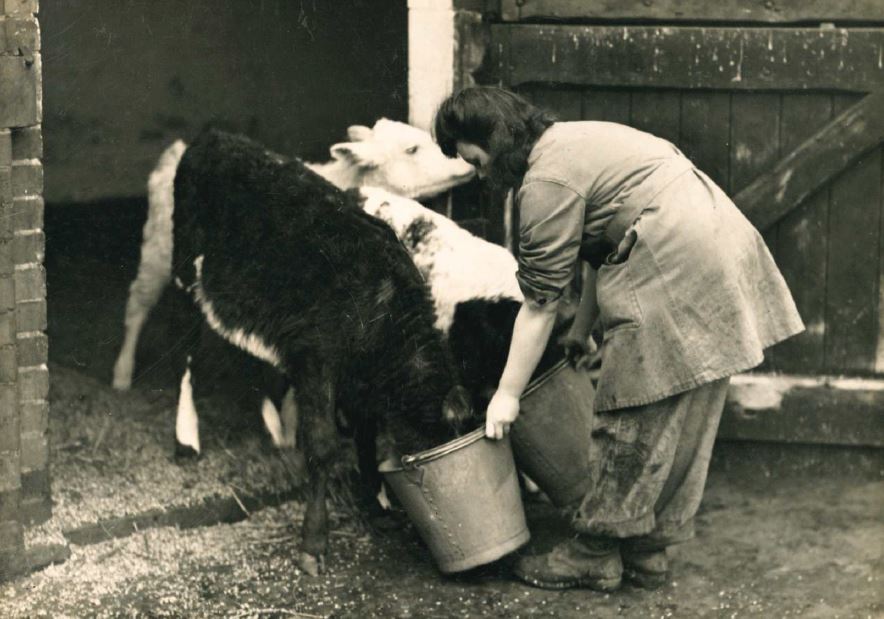Photo from the archive shows a Women’s Land Army recruit feeding calves
Written by Betty Plant for our Reaseheath Association Magazine 1962
During World War II, the Cheshire School of Agriculture, Reaseheath, was used as a training centre for the Women’s Land Army and I was fortunate to be one of the many hundreds of trainees who were sent there.
I can well remember my journey on April 13th 1942, from Yorkshire to Crewe, where I joined several other W.L.A. members resplendent in new uniform – all making their way to Nantwich. There was no transport at the station to meet us and we, poor innocents, believing Reaseheath to be just a little way out of town, started an uncomfortable trek. The journey seemed unending and the W.L.A. shoes and uniform became unbearably heavy, but at last we saw the gates and finally arrived at the Hall. We were to occupy both hostels and I was allocated to a bedroom in the Men’s Hostel together with three other Yorkshire girls.
The first evening we met Miss Black, who answered our many questions and made us feel “at home”. That illusion of “home” was soon shattered at the crack of dawn the next morning when we were noisily awakened and sent to our different jobs – our work in the Women’s Land Army had truly begun!
It is hard to describe my own feelings on that first, cold, dark morning in April. The farm animals and smells were all completely new to me and I felt as if I had suddenly been rocketed into another world. My first job was cleaning out and feeding the ducks and geese, and then, a few days later, I moved to the hens. During the daytime we had various lectures and sometimes a tour of inspection of the farms conducted by Mr. Barrett. After a brief session in the gardens, I started on “young stock” and then I really felt that I was farming in the true sense of the word. A week had elapsed since my arrival, and I was now accustomed to rising early. Feeding the calves was certainly a favourite job, and I was truly sorry to move on to my next job. In those days four horses were in regular use and they had to be cleaned out in the morning and bedded down at night. We learned how to gear them up ready for work and what a tangle we made of the harness at first but, as in all things, “practice makes perfect”, and in time we could harness the horses in the approved manner.
We had a session in the Dairy under Miss Bennion where we learnt the rudimentary facts of cheese and butter making, and the all-importance off cleanliness. Next, we learnt how to machine-milk (I always felt sorry for the long-suffering cows) and then on to hand-milking, practising on the rubber udder. It was most disconcerting to have the results of our hard work poured back and to be told to repeat the process!
The shortness of the course (one month) meant that much of the farm work was only briefly dealt with, but through livestock demonstrations we became familiar with sows, boars, sheep and bulls, learning to differentiate between good and bad types of various breeds. Throughout the month, routine work was being done at the Hall Farm and the Village Farm, and by helping we became accustomed to handling farm implements. Among other duties I set potatoes, spread muck, helped with fencing, sorted potatoes, dug out squitch and mixed and spread artificial manures.
There was light relief in the evenings when the day’s work was done, and, in spite of our aching backs and blistered hands, we enjoyed the social life. I often wonder what happened to all those “green” Land Army girls – how many fell by the wayside and, what is more important, how many went on to make farming their life, and so have reason to join with me in saying “thank you” to all the wartime staff at Reaseheath who helped to train the Women’s Land Army.

